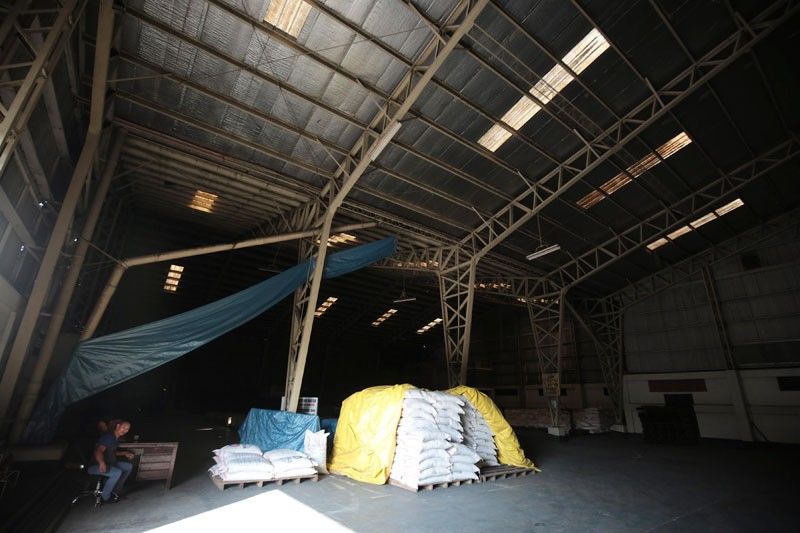Senators to National Food Authority chief: Resign

Sen. Grace Poe said it was obvious that Aquino failed in his job that led to near-zero buffer stocks of the food staple and caused a spike in prices of commercial rice. Michael Varcas
MANILA, Philippines — Senators yesterday urged National Food Authority (NFA) chief Jason Aquino to resign over his failure to ensure enough affordable rice for poor families.
Sen. Grace Poe said it was obvious that Aquino failed in his job that led to near-zero buffer stocks of the food staple and caused a spike in prices of commercial rice.
“I hope the President can find a competent replacement. Someone who can do what must be done in the NFA,” Poe told reporters.
The senator declined to speculate on suspicions of some of her colleagues, particularly Sen. Cynthia Villar, chair of the Senate committee on agriculture and food, that Aquino may have other motives in announcing the depleting NFA rice stocks.
Sen. Paolo Benigno Aquino IV called for the resignation of Aquino for failing to ensure food security for the Filipinos, especially the poor.
“We are talking about food security for the poorest Filipino families. We need someone who can get the job done,” the senator said.
Sen. Joel Villanueva warned Aquino to quickly shape up as the reported lapses and irregularities in his agency are affecting not only the poor but farmers as well.
“The NFA seriously needs to improve the implementation of its rice procurement policies such as the direct procurement of rice from farmers and cut out the middlemen, and hasten the importation process to replenish the NFA’s buffer stocks and insufficiencies,” Villanueva said.
Malacañang yesterday also advised NFA officials to resign if they can no longer perform their roles a day after senators berated them for creating panic over the alleged rice shortage.
Presidential spokesman Harry Roque agreed with senators that the grains agency should not have released false information about the rice supply.
“We are making an appeal again to the people in government, especially the appointees of President Duterte. We are here to serve the people and if we are having difficulty doing it, perhaps we can consider another career in the private sector,” Roque told radio station dzMM.
Asked if heads will roll because of the issue, Roque said: “That is the decision of the President... If the President learns that a wrongdoing was committed, no matter how close you are to him, you would be fired.”
The National Economic and Development Authority (NEDA) opposed another increase in the buying prices of palay by the NFA that will aggravate the agency’s debt burden and cause inflationary pressure.
Senator Villar on Tuesday urged the NFA Council to allow the increase in the buying price for palay by P1 to boost stocks.
The NFA currently buys palay for P17 per kilo. In turn, it sells regular-milled rice for P27 per kilo and well-milled rice for P32 per kilo.
But NEDA Undersecretary for Planning and Policy Rosemarie Edillon said increasing the support price to P18 per kilo might not even be enough to entice farmers to sell their produce to the NFA since private traders pay more.
“It may still not be effective since most farmers would rather do business with their suki (regular buyer) from whom they can get other favors,” she said yesterday.
Edillon also warned this may aggravate the NFA’s debt burden and would steer it away from its mandate.
She said the NFA does not exist to compete with traders, but only acts as support for farmers when there are no traders buying their produce.
Increasing the support price for palay will also increase the prevailing inflationary pressure since the NFA will also have to increase the selling price of milled rice.
“On inflation, it could jack up prices if NFA insists on competing with the market,” she said.
The NEDA is pushing for the liberalization of rice trade in the country through the replacement of the quantitative restriction (QR) on rice with tariffication to drive down inflation.
The QR on rice imports is a special privilege granted by the World Trade Organization (WTO), which has been extended three times since it was first imposed in 1995.
NEDA is pushing for the amendment of Republic Act No. 8178 or the Agricultural Tariffication Act of 1996 to pave the way for the removal of the QR on rice imports and the imposition of the 35- percent tariff rate instead.
Socioeconomic Planning Secretary Ernesto Pernia said earlier this month that with the expiration of the Philippines’ “Waiver on the Special Treatment of Rice” last June 30, there has been increasing pressure from WTO member-countries for the Philippines to fulfill its obligation to tariff rice. - With Czeriza Valencia, Alexis Romero
- Latest
- Trending
































